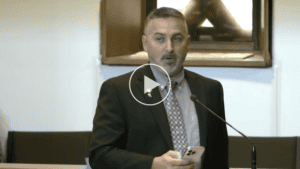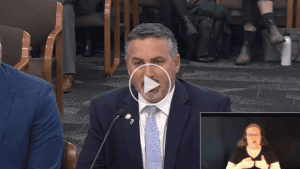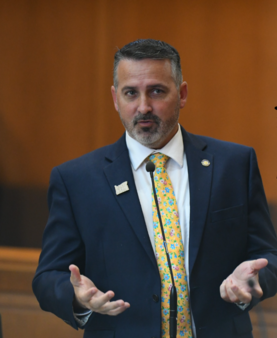By Representative Cyrus Javadi, House District 32
Just two weeks ago, the Legislature adjourned the 2024 legislative session. In even-numbered years, we meet for just 35 days. The session moves incredibly quickly, which makes it very difficult to provide accurate and up-to-date information in this newsletter during the session. But now that the session is over I want to bring you up to speed about what happened, the wins, the losses, and more.
First, the Legislature spent a lot of money this session, so I want to help you understand how that money impacts our community.
- $900,000 for Tillamook Family Counseling Center to purchase a transitional recovery home in Tillamook (SB 1530)
- $2 million for Nehalem Bay Health District for service expansions and upgrades to their Health and Senior Center in Wheeler (SB 5701)
- $2,709,000 for the City of Manzanita for water and storm infrastructure (SB 1530)
- $500,000 for Clatsop County to expand the number of detox and substance use disorder treatment beds (SB 5204)
- $274,057 for the city of Tillamook for improvements to the Jones-Knudsom affordable housing apartment complex (SB 1530)
- More than $16 million for Oregon Youth Authority dormitories, medical, and dental facilities in the district (HB 5202)
- $1 million to Clatsop County Historical Society for the expansion of the Oregon Film Museum (SB 5701)
Every time you send a tax dollar to the state government, it’s spent on something. I am glad that some of your tax dollars were reinvested in the North Coast. Keep reading to learn about the other things we did this session.
As always, please don’t hesitate to contact me with comments, questions, or concerns at 503-986-1432 or Rep.CyrusJavadi@oregonlegislature.gov.
Measure 110 is Dead
 WATCH: Rep. Javadi‘s speech on HB 4002, the Measure 110 reform bill
WATCH: Rep. Javadi‘s speech on HB 4002, the Measure 110 reform bill
The Governor said she intends to sign the Measure 110 reform bill passed by the Legislature earlier in March. I think it was a good first step, but I don’t think it’s enough to get us out of our drug crisis completely.
HB 4002 will effectively end Measure 110 as we know it. Associations representing District Attorneys, Sheriffs, and Police supported the bill as well. Without public pressure and Republicans holding firm, Democrats would have passed a far less effective bill than we ended up passing. This bill is far from perfect but does have some positive aspects.
The bill recognizes police and prosecutors have a role to play in disrupting the supply of dangerous drugs and protecting communities and people suffering from addiction.
There are four main pieces to this bill:
Make it easier to prosecute drug dealers: HB 4002 will reverse court rulings that have made it more difficult for district attorneys harder to prosecute drug dealers.
Enhanced penalties for dealers: HB 4002 will create stiff penalties for dealers who sell near parks, treatment facilities, and homeless shelters.
Recriminalizes drug possession: Possession of a controlled substance will now be an Unclassified Misdemeanor that carries up to 180 days in jail if a defendant fails a diversion program.
Creates voluntary county-level deflection programs: The legislation provides funding for local communities to build deflection plans that allow officers and prosecutors to divert people who would otherwise be charged with drug possession toward pre-booking diversion programs when appropriate.
Here’s what that means in practice:
A police officer arrests someone for using drugs. The officer or district attorney is encouraged to refer the person to a deflection program – think of a deflection program as a treatment program. There are few details about how deflection programs will look right now, and will vary from county to county.
If they complete the deflection program, their arrest records will be expunged, and they will spend no time in jail. If they fail the deflection program, they are given another chance to avoid jail via a conditional discharge diversion, which is 12 months of supervised probation. If they fail conditional discharge diversion, they will get convicted of a Unclassified Misdemeanor with probation. If they fail probation, probation is revoked, and they get up to 180 days in jail.
Essentially, drug users get three opportunities to avoid jail.
Notably, here is what is not in the bill that I wish were:
- It doesn’t repeal Measure 110.
- It doesn’t make sobriety a goal of our drug policy.
- It doesn’t remove “harm reduction” as a core measurement of success
- Data tracking isn’t required to include sobriety as a measurement of success.
Another Housing Package
The other big piece of legislation we passed this session was the Governor’s housing package.
Senate Bill 1537 appropriates nearly $90 million for housing-related goals and efforts, including setting up the new Housing Accountability & Production Office and some money for housing infrastructure. However, the vast majority will go toward a loan fund that developers can use to build low-income housing.
It will also allow local cities to move their urban growth boundary (UGB) to accommodate more housing production if they meet specific requirements. Under the bill, most North Coast cities may be eligible to expand their UGB by up to 50 acres to build more housing. Cities with populations over 25,000 can expand their UGB by up to 100 acres.
This portion of the bill sets this housing package apart from previous ones. Until now, we have done very little to give cities more land to build homes. That’s partly due to our decades-old land use laws that have proven very restrictive over time. I am encouraged to see us trying something new to tackle our housing crisis beyond just spending more money on subsidies.
The second bill in the package is SB 1530. It appropriates nearly $280 million for emergency homeless shelters, infrastructure projects that will aid in housing construction, and even money for recovery housing and low-income housing repairs.
This video provides good details on what is in the package.
|
|
Oregonians will be limited in how much they can give their favorite political cause (in 2027)
As the Legislature raced to the finish line, a compromise campaign finance reform bill passed both the House and Senate with broad bipartisan support.
For many years, Oregon was one of the few states in the nation without any campaign finance reform limits, but after Ballot Measure 107 passed in 2020, which allowed the state to adopt limits, it was only a matter of time before we got some kind of regulation. Competing ballot measures that threatened campaign finance reform of some sort were being circulated and set to go on the November ballot. This encouraged legislators to negotiate on a bill. As a result, the ballot measure campaigns have dropped their efforts.
Under House Bill 4024, starting in 2027, individuals and businesses will be capped at giving only $3,300 per election to a candidate for State House, State Senate, circuit court judges, district attorneys, and local candidates like city council. Individuals and businesses will be capped at $10,000 to give to state parties and caucus committees.
What is new in this bill would be what is known as small-donor committees (SDC) and membership organizations. Individuals and businesses will be able to contribute up to $250 per year to an SDC and an unlimited amount to membership organizations. An SDC is defined as a committee that doesn’t take any contributions over $250.
In turn, membership organizations can give up to $66,000 to State House, State Senate, circuit court judges, and district attorneys and $33,000 to local candidates per election year. SDC’s may give $33,000 to statewide candidates for every 2,500 donors they have. If they meet the 10,000 donor threshold, they can double their giving from $132,000 to $264,000.
There are also allowances for membership organizations to donate in-kind personal services, meaning they can pay someone to work on a candidate’s campaign.
State Board of Forestry Passes Habitat Conservation Plan

Earlier this month, the Oregon Board of Forestry approved a 70-year plan that will reduce timber operations on about 630,000 acres of state-owned timberland in the state of Oregon. The plan passed narrowly, along a 4-3 vote. I was proud to stand up against this plan with our natural resource community.
The effort is aimed at protecting endangered species. (We know how well the government has been at doing that: Shooting barred owls to save spotted owls in the Northwest)
The plan will crush rural communities that thrive on their timber industry to provide jobs and tax revenue for local services. Clatsop and Tillamook counties are expected to lose over $8 million per year in tax revenue – by far the most significant impact of any county in Oregon.
Take a look at the implications for other counties here:

It’s not just county budgets, which include services like elections, sheriff’s offices, and road maintenance. School districts also rely on timber revenue from state lands.
 I again introduced legislation, not to stop the HCP, but to require some additional accountability and transparency from the Department of Forestry. Democrats again killed that legislation this session, but they allowed us to publicly present our case to the committee. Watch my testimony here, along with the testimony of Heath Curtiss of Hampton Lumber.
I again introduced legislation, not to stop the HCP, but to require some additional accountability and transparency from the Department of Forestry. Democrats again killed that legislation this session, but they allowed us to publicly present our case to the committee. Watch my testimony here, along with the testimony of Heath Curtiss of Hampton Lumber.
On the day before the vote, the entire House and Senate Republican Caucus sent a letter to the Board of Forestry asking them to reject the plan and revise it with a less damaging one.



|
|
How State Policy is Driving Utility Bill Increases
We all know inflation has caused everything to be more expensive. But it’s not just government spending that causes inflation to increase – it’s regulation, too.
You might have seen increases on your utility bill at the beginning of this year. PGE kicked off the year with a 17% rate increase for customers. It’s easy to blame PGE for the increases, but we must closely examine why they are increasing their rates.
Look at the recent filing from PGE about why they will request another rate increase in 2025. They talk about the investments they are making in “clean energy.” Whatever you think about this kind of energy, the bottom line is that it is just more expensive. Yet, government, at both the federal and state levels, continues to push utilities in this direction.

In their testimony in support of the rate increase, PGE’s CEO and Vice President of Strategy Regulation and Energy Supply contend that this rate increase is necessary to comply with the mandates of Oregon House Bill 2021, which requires PGE and Pacific Power to submit plans to reduce emissions by 80% from a baseline amount by 2030, 90% by 2035, and completely eliminate emissions by 2040.

|
|
New Systems at the Employment Department
The Oregon Employment Department (OED) launched a new system for Unemployment Insurance (UI) benefits. The new UI system is Frances Online, the same system already used for employer contributions and Paid Leave Oregon benefits.
Action Required for Current Claimants
- Create a Frances Online account at frances.oregon.gov. If you have an active claim or applied but your claim is still being reviewed, information about your claim will appear in your new Frances Online account. If you have an account in Frances Online because you claimed benefits from Paid Leave Oregon, you do not need to set up a new account.
- File weekly claims at frances.oregon.gov/claimant.
Customer Service Tips
OED expects the Unemployment Insurance Program will receive high call volumes for at least the first couple of weeks after going live in the new system. They are encouraging customers to use self-serve features available through Frances Online such as checking the status of a claim, uploading documents online, or making a payment online. Go to unemployment.oregon.gov/frances for more customer service tips.
Don’t be afraid to reach out to me if you run into issues with this new system and we can help you navigate it.
|
|
Capitol Phone: 503-986-1432
Capitol Address: 900 Court St. NE, H-373, Salem, Oregon 97301
Email: Rep.CyrusJavadi@oregonlegislature.gov
Website: https://www.oregonlegislature.gov/javadi


